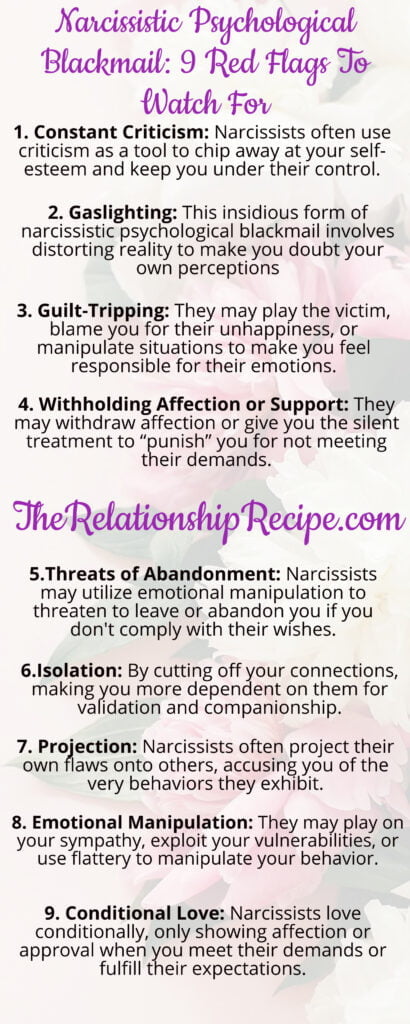Surviving Narcissistic Psychological Blackmail
As someone who has navigated the treacherous waters of narcissistic emotional manipulation, I understand the toll it can take on one’s mental and emotional well-being. It’s a complex, and often subtle form of psychological manipulation that can leave you feeling trapped and powerless.
Through my own experience, I’ve learned to identify the typical narcissistic psychological blackmail warning signs, develop coping strategies, and finally go on a journey of healing.
Here are nine examples of red flags to watch for, along with some insights into coping with narcissistic abuse tactics and reclaiming your life.
9 Examples of Narcissistic Psychological Blackmail
1. Constant Criticism
Narcissists often use criticism as a tool to chip away at your self-esteem and keep you under their control. They may nitpick everything you do, never acknowledging your accomplishments or strengths.
In a narcissistic relationship, constant criticism serves as a potent tool for the narcissist to maintain control and dominance over their partner. They nitpick every action, never acknowledging achievements, and magnify minor flaws, leaving the victim feeling inadequate and demoralized.
Despite efforts to please, nothing satisfies the narcissist’s impossible standards, creating a cycle of self-doubt and emotional dependency. Recognizing this pattern is important for breaking free from emotional abuse, setting boundaries, seeking support, and prioritizing self-care, allowing the victim to reclaim their power and rebuild self-esteem on a foundation of self-love and respect.

2. Gaslighting:
This insidious form of narcissistic psychological blackmail involves distorting reality to make you doubt your own perceptions and memories. Gaslighting can leave you feeling confused, invalidated, and unsure of yourself.
Imagine you’re engaged in a conversation with your partner about an event that occurred the previous week. You vividly remember the details, including where you were, what you were doing, and who else was present.
However, as you recount the experience to your partner, they start to subtly question your version of events. They suggest that perhaps your memory is faulty or that you’re exaggerating certain aspects of the story.
Initially, you brush off their comments, but as they persist, you start to doubt yourself.
Maybe you misremembered the sequence of events or misunderstood what was said. Over time, these subtle doubts begin to accumulate, and you find yourself questioning your own perceptions and memories.
Gaslighting leaves you feeling confused, invalidated, and unsure of yourself, eroding your sense of reality and leaving you vulnerable to manipulation. Truth holds ZERO value when it comes to narcissistic abuse tactics.

3. Manipulative Guilt-Tripping:
The acronym FOG comes to mind when discussing narcissistic psychological blackmail. FOG stands for Fear, Obligation and Guilt.
Narcissists excel at using guilt as a weapon for emotional manipulation. They may play the victim, blame you for their unhappiness, or manipulate situations to make you feel responsible for their emotions.
Imagine you’re excitedly discussing plans to visit friends over the weekend with your partner, but they seem disinterested. Later, when you’re about to leave, your partner suddenly becomes withdrawn and somber.

Sensing something is amiss, you inquire about their sudden change in mood, only to be met with a barrage of accusations. They claim you’re abandoning them, making them feel lonely and neglected, and guilt-trip you for prioritizing your social life over their emotional needs.
Despite your attempts to reassure them and explain that spending time with friends doesn’t diminish your love for them, they continue to play the victim, using emotional manipulation for the situation to make you feel responsible for their unhappiness.
This manipulative guilt-tripping leaves you torn between your desire for independence and your partner’s emotional demands, creating a sense of guilt and obligation that keeps you tethered to the narcissist’s whims.

4. Withholding Affection or Support:
Emotional blackmailers often use love, affection, or support as emotional manipulation to get what they want. They may withdraw affection or give you the silent treatment to “punish” you for not meeting their demands.
Do not expect empathy from a narcissist. They are mostly, if not totally, devoid of empathy, unless it’s to get a result from you that they are after.
Picture this scenario: you’ve had a long day at work, and all you crave is the comfort and support of your partner. As you walk through the door, you’re met with icy silence. Your partner barely acknowledges your presence, refusing to make eye contact or engage in conversation.

Confused and hurt, you try to initiate affection, but your attempts are met with indifference or outright rejection. Despite your best efforts to understand what’s wrong, your partner remains tight-lipped, using their silence as psychological manipulation to punish you for some perceived slight or failure to meet their expectations.
The absence of affection and support leaves you feeling isolated and unworthy, craving the love and validation that your partner is withholding as a means of emotional manipulation.
This psychological manipulation not only undermines your sense of security in the relationship, but also reinforces your dependence on your partner’s approval, perpetuating a cycle of control and submission.

5. Threats of Abandonment:
Narcissists may utilize emotional manipulation to threaten to leave or abandon you if you don’t comply with their wishes. These threats can instill fear and insecurity, making you feel like you have no choice but to comply.
You’re in the midst of a disagreement with your partner over a trivial matter, and suddenly, they drop a bombshell: “If you don’t do what I say, I’ll leave you.” The threat of abandonment hangs heavy in the air, leaving you paralyzed with fear and uncertainty.
You try to reason with them, pleading for them to reconsider, but they remain unmoved, using the threat of abandonment as a means of emotional manipulation to get their way. The mere suggestion of being left alone, may trigger deep-seated insecurities and doubts about your worthiness of love and companionship.
You may find yourself bending over backward, and making yourself smaller to meet their constant and ever changing demands, sacrificing your own needs and desires in a desperate bid to avoid being abandoned.
This toxic cycle of psychological manipulation and fear erodes your self-esteem and keeps you trapped in a relationship dynamic where your worth is constantly called into question, and your autonomy is systematically undermined. This is what is known as a trauma bond.

6. Isolation:
They may use narcissistic abuse tactics to try to isolate you from friends, family, or other sources of support to increase their control over you. By cutting off your connections, they make you more dependent on them for validation and companionship.
You’ve been looking forward to attending a gathering with your close friends, but as the date approaches, your partner starts planting seeds of doubt. They subtly undermine your relationships with your friends, insinuating that they don’t really care about you or have your best interests at heart. This narcissistic psychological blackmail is a form of triangulation.
They may express disapproval of your friends’ lifestyles or criticize their personalities, slowly chipping away at your trust and confidence in those relationships. Eventually, you find yourself making excuses to avoid socializing with your friends, preferring to spend all your time with your partner.
Without the support and perspective of your friends, you become increasingly isolated and dependent on your partner for validation and companionship. Their emotional manipulation tactics have effectively severed your ties with external sources of support, leaving you vulnerable to their control and influence.

7. Projection:
Narcissists often project their own flaws onto others, accusing you of the very behaviors they exhibit. This deflects attention away from their own shortcomings and keeps you on the defensive.
Consider a scenario where you notice your partner frequently staying out late without providing any explanation or communication. When you express concern about their behavior, they immediately become defensive and accuse you of being overly controlling and suspicious.
They claim that you’re the one who doesn’t trust them, projecting their own unfaithful tendencies onto you. Despite your attempts to address the issue calmly and rationally, they continue to deflect blame onto you, making you feel guilty for even raising the topic.
By projecting their own flaws onto you, they effectively shift the focus away from their own questionable behavior, leaving you on the defensive and doubting your own instincts. This manipulation tactic serves to protect their fragile ego and maintain their sense of superiority, while keeping you trapped in a cycle of confusion and self-doubt.

8. Emotional Manipulation:
Narcissists are skilled at manipulating your emotions to get what they want. They may play on your sympathy, exploit your vulnerabilities, or use flattery to manipulate your behavior.
Imagine confiding in your partner about a personal struggle you’re facing, seeking comfort and support. Instead of offering empathy or understanding, they seize the opportunity to exploit your vulnerability for their own gain.
They may use guilt-tripping tactics, playing the victim and making you feel responsible for their emotional well-being. Alternatively, they could resort to flattery, showering you with praise and affection to manipulate your behavior and coerce you into complying with their wishes.
Regardless of the approach they take, the underlying goal remains the same: to control by use of emotional manipulation in order to fulfill their own desires. Over time, you find yourself second-guessing your own feelings and instincts, constantly seeking validation and approval from your partner while ignoring your own needs and boundaries.
This insidious form of emotional manipulation leaves you feeling powerless and trapped in a relationship where your emotions are constantly being exploited for the narcissist’s benefit.

9. Conditional Love:
Narcissists love conditionally, only showing affection or approval when you meet their demands or fulfill their expectations. This leaves you constantly striving for their validation and approval.
You’ve been working tirelessly on a project that holds great significance to you, pouring your heart and soul into every detail. When you excitedly share your progress with your partner, hoping for words of encouragement and support, their response is lukewarm at best. They dismiss your efforts as insignificant, pointing out flaws and imperfections instead of acknowledging the dedication and passion you’ve invested.
However, later that evening, when you acquiesce to their demands and agree to cancel plans with friends to spend time with them, their demeanor suddenly changes. They shower you with affection and praise, basking in your compliance and obedience.
This conditional display of love is a form of psychological manipulation leaves you feeling like you’re constantly walking on eggshells, desperately striving to meet their ever-shifting expectations in a futile attempt to earn their validation and approval.
Your worthiness of love and affection becomes contingent upon your ability to fulfill their often impossible demands, creating a sense of insecurity and inadequacy that keeps you perpetually trapped in a cycle of seeking their elusive approval.

Coping With Narcissistic Abuse Tactics
Coping with emotional manipulation inflicted by a narcissistic partner or loved one can feel overwhelming, but it’s essential to prioritize your own well-being. Here are some strategies that have helped me navigate these challenging situations:
- Set Boundaries: Establish clear boundaries and stick to them, even if it means facing resistance or backlash from the narcissist.
- Seek Support: Reach out to friends, family, or a therapist for support and validation. Having a strong support network can provide invaluable emotional reinforcement.
- Practice Self-Care: Prioritize self-care activities that nurture your physical, emotional, and mental well-being. Engage in hobbies, exercise, meditation, or whatever brings you joy and relaxation.
- Educate Yourself: Learn about narcissistic behavior and emotional manipulation to better understand what you’re dealing with and how to protect yourself.
- Detach Emotionally: Try to detach emotionally from the narcissist’s manipulative tactics. Remind yourself that their behavior says more about them than it does about you.

Healing From Narcissistic Psychological Blackmail
Healing from a narcissistic relationship is a journey that requires time, patience, and self-reflection. Here are some steps that have aided me in reclaiming my sense of self and moving forward:
- Acknowledge Your Experience: Validate your feelings and experiences, and recognize that you are not alone. It’s essential to acknowledge the impact of the abuse and give yourself permission to heal.
- Practice Self-Compassion: Be kind and gentle with yourself as you navigate the healing process. Practice self-compassion and remind yourself that you deserve love, respect, and happiness.
- Let Go of Guilt: Release any guilt or self-blame you may be carrying. You are not responsible for the narcissist’s actions or emotions, and you deserve to prioritize your own well-being.
- Focus on Personal Growth: Use this experience as an opportunity for personal growth and self-discovery. Invest in activities that nurture your self-esteem, confidence, and sense of identity.
- Seek Professional Help: Consider seeking therapy or counseling to process your emotions, gain perspective, and develop healthy coping strategies for moving forward.

Remember, healing from narcissistic emotional manipulation is a gradual process, but with patience, self-care, and support, it is possible to reclaim your power and rebuild your life on your own terms. You are worthy of love, respect, and happiness, and you have the strength within you to overcome this challenge.
https://proudintrovert.medium.com/5-emotional-blackmail-examples-that-narcissists-use-9d22cb5a9d97
This post may contain affiliate links. I earn from qualifying Amazon purchases at no extra cost to you.




